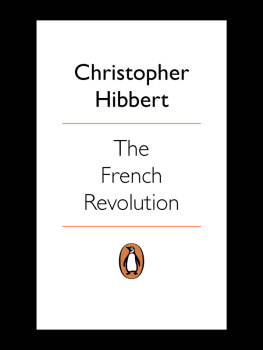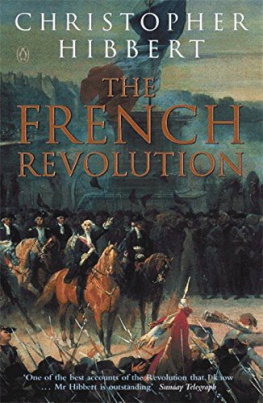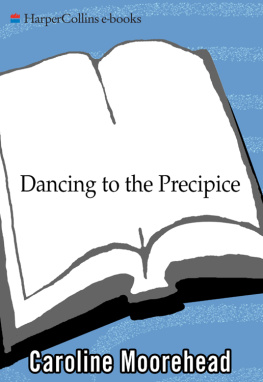This is a narrative history of the French Revolution from the meeting of the Estates General at Versailles in 1789 to the coup dtat of 18 Brumaire which brought Napoleon to power ten years later. It concentrates upon events and people rather than ideas, particularly upon those journes which helped to decide the course of the Revolution and upon those men and women involved in them. It is written for the general reader unfamiliar with the subject rather than the student, though I hope the student to whom the field is new may find it a readable introduction to the works of those historians to whom I myself am indebted. I want particularly to mention, and to thank, Professors Georges Lefebvre, Albert Soboul, Alfred Cobban, Richard Cobb, George Rud, A. Goodwin and Norman Hampson. I am most grateful to Richard Cobb, Professor of Modern History in the University of Oxford, for having read the typescript and for having given me much valuable advice for the books improvement.
I want also to thank my friends, Mr R. H. Owen, who helped me with various translations when we were working on the book in Paris, and Mr John Guest who has been my most skilful and trusted editor for over twenty years. For their help in a variety of other ways I am deeply indebted to Mrs John Rae, Mrs Francis Pollen, Mrs John Street and to my wife for compiling the index.
C. H.
Appendix 1 provides some information about the fate of characters whose end is not recorded in the text;
Appendix 2 is a glossary of French terms used in the text;
Appendix 3 is a table of the principal events in France from 1788 to 1799.
COURT AND COUNTRY
Never was any such event so inevitable yet so completely unforeseen
ALEXIS DE TOCQUEVILLE
In a quiet corner of the park at Versailles stands that delightful little pavilion of honey-coloured stone known as the Petit Trianon. Designed for Madame de Pompadour, King Louis XVs entertaining mistress, it had become His Majestys favourite retreat. He was staying here in April 1774 when it was noticed by the light of a candle as he bent over a table that his cheeks were blotched with red marks, symptoms of smallpox. At sixty-four, with a constitution weakened by excess, he was not expected to recover. With little hope of doing so himself he said that he would like to die where he was. He was advised, however, that the setting was inappropriate. So the doctors wrapped him in a cloak, carried him down to a waiting coach and had him transported back to the palace. And here, in his bedchamber, while priests listened to his confession and his face became swollen and dark, a candle was placed in the window to be snuffed out when he died.
His grandson, who was to succeed him, repeatedly glanced at the candle through the windows of his own room. It was still burning when he went to bed on 9 May. But in the early hours of the following morning the flame was extinguished. The Lord Chamberlain came out into the antechamber known as the Oeil de Boeuf to announce to the courtiers waiting behind the railings, Gentlemen, the King is dead.
The new King, Louis XVI, was nineteen years old. Although kind and generous by nature, his manner was usually brusque, cold and formal, marked by fits of ill humour and sharp retorts. His Keeper of the Seals had never known anyone whose character was more contradicted by outward appearances. He was really good and tender-hearted. You could never speak to him of disasters or accidents to people without seeing a look of compassion come over his face, yet his replies [were] often hard, his tone harsh, his manner unfeeling. Hesitant, reserved and ungainly, his appearance, too, was unprepossessing. He had clear blue eyes and abundant fair hair, but his mouth was over-full and flabby and his chin was pale and fat.
He was so short-sighted that he could not recognize anyone at a distance of more than three paces [one of his wifes ladies-in-waiting, the Comtesse de La Tour du Pin, wrote in her memoirs]. He was stout, about five foot six or seven inches tall, square shouldered and with the worst possible bearing. He looked like some peasant shambling along behind his plough. There was nothing in the least stately in his clothes, putting on whatever was offered to himHis sword was a perpetual embarrassment to him.
Possessed of great physical strength, he spent days on end hunting, galloping at reckless speed through his forests after stags and deer, roebuck and boar, but he could never keep his weight down for his appetite for rich food was voracious. Religious and most exact about Mass, he ate nothing between breakfast and supper in Lent, but at other times of the year he indulged himself to the full. It was said that one morning before going down to the stables he had consumed four cutlets, a chicken, a plateful of ham, half a dozen eggs in sauce and a bottle and a half of champagne. Even at his wedding banquet-though he had appeared nervous, embarrassed and gloomily apprehensive at the preceding marriage ceremony the guests in their tiered boxes in the Salle de Spectacle had seen him put down his head with gusto at the royal familys balustraded table in the centre of the floor. You really should not stuff yourself so on a night like this, his grandfather had admonished him. Why not? he had asked. I always sleep better after a good meal.
He had been fifteen then. His bride, Marie Antoinette, was just over a year younger, though she looked little more than twelve years old. Alert, affectionate, highly strung and wilful, she was the daughter of the formidable Empress Maria-Theresa of Austria who who had given birth to her, the fifteenth of her children, in an armchair at the Hofburg and had then almost immediately returned to the examination of her state papers which the labour pains had briefly interrupted. Marie Antoinette had been extremely badly educated but, although she had few interests and was not in the least intellectual, her mind was much sharper and she was far more vivacious. When she had said goodbye to her family and had been carried away in a vast cavalcade to an island in the Rhine where she had been stripped of all her Austrian clothing in a tent before being handed over naked to the French she had burst into tears. But on arrival at Versailles she had soon recovered herself. She had found the Dauphin, whom she had been sent to marry, not nearly so horrid as she had feared he might be, and on the day of the wedding she was seen to be looking quite happy and calm. Occasionally she betrayed a hint of nervousness during the service; yet, beside the trembling, blushing figure of her husband, she seemed a model of composure, and, indeed with her lovely complexion, clear blue eyes and shining fair hair of beauty.
The Dauphins nervousness was understandable. Not only had he never known a girl of his own age, but he had been brought up in the belief that attractive women were a danger to the soul. His gloomy, fastidious father, who had died when he was eleven, had pointed out his grandfathers many mistresses to him as representatives of the kind of excess against which he himself must always be on his guard. So had his mother, a kindly, pious woman who had not long outlived her husband. So had his maiden aunts with whom he had spent much of his time after his parents early death. Nor was it only attractive women against whom he had been warned: he had been taught to beware of the wiles of Austria, Frances traditional enemy. A pretty Austrian girl was, therefore, doubly hazardous.
After supper on his wedding night he and his bride were escorted to the Dauphines bedroom on the ground floor. Watched by numerous courtiers, the Dauphines ladies ritually removed her jewellery, shoes and dress as custom dictated; the Dauphin then undressed while the King stood ready to hand him his nightshirt. Bride and bridegroom then climbed into the marital bed, whose sheets had been sprinkled with holy water, and were addressed by a bishop with reverentially hopeful prayers. The curtains were then drawn back to reveal the seated couple before being closed again. Soon afterwards the Dauphin went to sleep.














